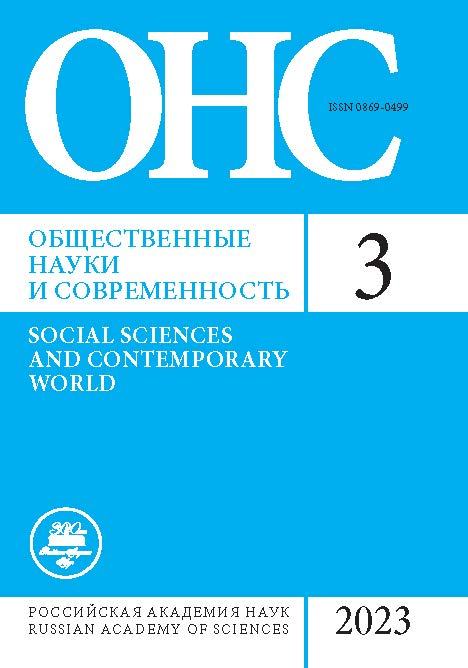Historical policy and memorial culture in Latvia in the early 2020s
- Autores: Kyrchanoff M.W.1
-
Afiliações:
- Voronezh State University
- Edição: Nº 3 (2023)
- Páginas: 94-108
- Seção: Postsoviet space
- URL: https://clinpractice.ru/0869-0499/article/view/675190
- DOI: https://doi.org/10.31857/S0869049923030073
- EDN: https://elibrary.ru/GIKFFM
- ID: 675190
Citar
Texto integral
Resumo
The politics of memory in the Latvian Republic in the early 2020s are analyzed. The role and place of intellectual communities is studied. These communities act as the main spaces of the genesis and functioning of memorial culture and collective historical memory in modern social and political thought in Latvia. The novelty of the study lies in the examination of the current stage in the development of the historical policy of the Latvian society in the context of a lack of original sources-based interdisciplinary works focused on the analysis of the memorial cultures of the post-Soviet space in Russian historiography. It is shown that: 1) as one of the systemic segments of modern Latvian society, the intellectual community significantly contributes to the development and transformation of memorial culture; 2) the range of memorial practices of Latvian intellectuals varies from historical revisionism to attempts to form a liberal memorial canon; 3) memorial practices of modern intellectual community are interconnected with the development of civil and ethnic nationalist discourse; 4) the participation of intellectuals in memorial politics actualizes the political and ideological heterogeneity of modern society, contributing to the parallel development of various forms and dimensions of historical memory. It is assumed that the role of the Latvian civil society in the historical politics of modern Latvia will increase, and the intellectual community will remain an active participant in collective memory policy.
Palavras-chave
Sobre autores
Maksym Kyrchanoff
Voronezh State University
Email: maksymkyrchanoff@gmail.com
Voronezh, Russia
Bibliografia
- Акудовiч А., Казакевiч А. (2006) Навука i стратэгi i працы з мiнулым. Дыскусiя ў межах семiнара "Сучаснае беларускае мысленне", Iнстытут сацыялогii, Iнстытут фiласофii НАН, 16 сакавiка 2006 года // Палiтычная сфера. № 6. С. 44-48.
- Дюков А.Р. (2018) Участие прибалтийских коллаборационистов в блокаде Ленинграда: проблемы правовой квалификации // Журнал российских и восточноевропейских исторических исследований. № 4. С. 108-132.
- Зверев К.А. (2020) Государственная историческая политика в современной Латвии // Проблемы национальной стратегии. № 1. С. 163 - 177.
- Касьянов Г. (2009) Голодомор и строительство нации // Pro et Contra. № 3-4. С. 24-42.
- Кирчанов М.В. (2019) Континуитет и дискретность в современных исторических памятях стран Балтии (мифы политической нации vs мифы политизированной этничности) // Журнал российских и восточноевропейских исторических исследований. № 1. С. 180-218.
- Лескинен М.В. (2021) Историческая политика и национальная мифология: "постправда" и наука на государевой службе. Новое прошлое. № 2. С. 66-82.
- Макаров А.И. (2014) Историческая память: конструкция или реконструкция? // Историческая экспертиза. № 1. С. 4-10.
- Маркава А. (2012) Гiстарычная свядомасць як прадмет самарэфлексii ў чэшскайг iстарыяграфii // Беларускi Гiстарычны Агляд. № 19. С. 179-212.
- Assmann A. (2010) From Collective Violence to a Common Future: Four Models for Dealing with a Traumatic Past // In: Conflict, Memory Transfers and the Reshaping of Europe. Newcastle: Cambridge Scholars Publishing. Pp. 8-23.
- Assmann A. (2015) Shadows of Trauma: Memory and the Politics of Postwar Identity. NY: Fordham University Press. 312 p.
- Brüggemann K., Kasekamp A. (2008) The Politics of History and the "War of Monuments" in Estonia // Nationalities Papers. No. 36. Pp. 425-448.
- Coakley J. (2004) Mobilizing Past: Nationalist Images of History // Nationalism and Ethnic Politics. No. 10. Pp. 531-560.
- Cvijic S. (2008) Swinging the Pendulum: World War II History, Politics, National Identity and Difficulties of Reconciliation in Croatia and Serbia // Nationalities Papers. No. 36. Pp. 713-740.
- Forchtner B. (2016) Lessons from the Past?: Memory, Narrativity and Subjectivity. L.: Palgrave Macmillan. 340 р.
- Friedman J. (1992) Myth, History, and Political Identity // Cultural Anthropology. No. 7. Pp. 194-210.
- Gensburger S., Lefranc S. (2020) Beyond Memory: Can We Really Learn From the Past? L.: Palgrave Macmillan. 185 р.
- Halbwachs M. (1925) Les Cadres sociaux de la mémoire. Paris: Félix Alcan. 299 р.
- Keightley E., Pickering M. (2017) Memory and the Management of Change: Repossessing the Past. L.: Palgrave Macmillan. 237 р.
- Koposov N. (2017) Memory Laws, Memory Wars: The Politics of the Past in Europe and Russia. Cambridge: Cambridge University Press. 338 p.
- Kyrchanoff M.W. (2022) Nationalism and Historical Politics: Western or Eastern European Phenomenon? // Российский журнал исследований национализма. №. 1-2. С. 136-158.
- Miller A. (2016) Memory Control // Russia in Global Affairs. No. 14, Pp. 120-131.
- Nora P. (2010) Rethinking France: Les Lieux de mémoire. Vol. 4: Histories and Memories. Chicago: University of Chicago Press. 504 р.
- Pickering M., Keightley E. (2015) Photography, Music and Memory: Pieces of the Past in Everyday Life. London: Palgrave Macmillan, 222 р.
- Skultans V. (2002) The Testimony of Lives: Narrative and Memory in Post-Soviet Latvia. L.: Routledge. 217 p.
Arquivos suplementares










